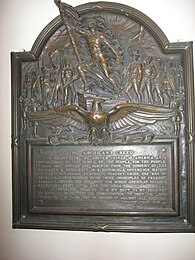The American Creed refers to emphasizing liberty, equality, individualism, populism, and laissez faire.[1] The creed was initially formulated by Thomas Jefferson [2]. It is used to justify American Exceptionalism, with G.k. Chesterson writing "America is the only nation in the world that is founded on a creed" [3]
The American Creed has been challenged by group based discrimination against African Americans, as well as various attempts to assert group rights, such as affirmative action [1]
The American's Creed edit

"The American's Creed" is the title of a resolution passed by the U.S. House of Representatives on April 3, 1918. It is a statement written in 1917 by William Tyler Page as an entry into a patriotic contest.
I believe in the United States of America, as a government of the people, by the people, for the people; whose just powers are derived from the consent of the governed; a democracy in a republic; a sovereign Nation of many sovereign States; a perfect union, one and inseparable; established upon these principles of freedom, equality, justice, and humanity for which American patriots sacrificed their lives and fortunes. I therefore believe it is my duty to my country to love it, to support its Constitution, to obey its laws, to respect its flag, and to defend it against all enemies.
— William Tyler Page, The American's Creed[4]
See also edit
References edit
- ^ a b Lipset, Seymour (1992). "Affirmative Action and the American Creed". The Wilson Quarterly (1976-). 16 (1). Wilson Quarterly: 52–62.
{{cite journal}}:|access-date=requires|url=(help) - ^ Huntington, Samuel (2004). Who are we?: The challenges to America's national identity. Simon & Schuster. p. xv. ISBN 0-684-87053-3.
- ^ Chesterton, G.K. (1922). What I saw in America. Hodder and Stoughton. p. 7.
- ^ The American's Creed at USHistory.org
Further reading edit
- Murdock, Myrtle Cheney (1958), The American's Creed and William Tyler Page, Monumental Press. ISBN 978-1258318864
- Page, William Tyler (1921), The Book of the American's Creed, Sons of the American Revolution: The Country Life Press. OCLC 4783599
Category:American nationalism Category:National symbols of the United States Category:Oaths